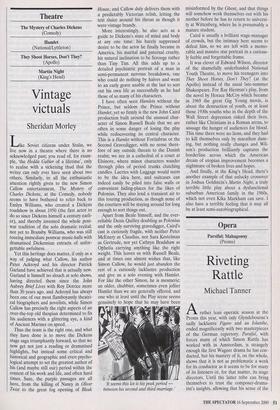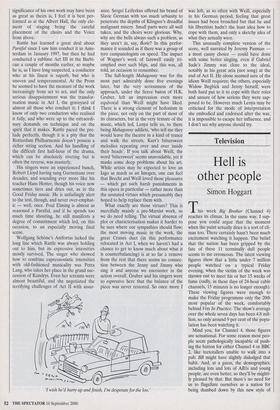Opera
Riveting Rattle
Michael Tanner Arather lean operatic season at the Proms this year, with only Glyndebourne's sadly lacklustre Figaro and an lolanthe, ended magnificently with two masterpieces of the German repertory. Parsifal, with forces many of which Simon Rattle has worked with in Amsterdam, is strangely enough the first Wagner drama he has con- ducted, but his mastery of it, on the whole, shows that it is not as problematic a work for its conductor as it seems to be for many of its listeners or, for that matter, its stage directors. Until the latter tribe can bring themselves to trust the composer-drama- tist's insights, allowing that his sense of the significance of his own work may have been as great as theirs is, I feel it is best per- formed as at the Albert Hall, the only ele- ment of staging being the careful placement of the choirs and the Voice from above.
Rattle has learned a great deal about Parsifal since I saw him conduct it in Ams- terdam in January 1997, but then he had conducted a sublime Act III in the Barbi- can a couple of months earlier, so maybe he is, as I have long suspected, a conductor who at his finest is superb, but who is uneven and temperamental. At the Prom he seemed to have the measure of the work increasingly from act to act, and the only serious disappointment was the transfor- mation music in Act I, the graveyard of almost all those who conduct it; I think I know of only two conductors who realised it fully, and who were up to the extraordi- nary demands on technique and on the spirit that it makes. Rattle paced the pre- lude perfectly, though it is a pity that the Rotterdam Philharmonic doesn't possess a richer string section. And his handling of the difficult first half-hour of the drama, which can be absolutely riveting but is often the reverse, was masterly.
His singers were an experienced bunch, Robert Lloyd having sung Gurnemanz over decades, and sounding ever more like his teacher Hans Hotter, though his voice now sometimes tires and dries out, as in the Good Friday music. He is unfailingly alert to the text, though, and never over-emphat- ic — well, once. Poul Elming is almost as seasoned a Parsifal, and if he spends too much time shouting, he still manifests a degree of commitment which led, on this occasion, to an especially moving final scene.
Wolfgang Schone's Amfortas lacked the long line which Rattle was always holding out to him, but its expressive intensities mostly survived. The singer who showed how to combine expressionistic intensities with old-fashioned musicality was Petra Lang, who takes her place in the grand suc- cession of Kundrys. Even her screams were almost beautiful, and she negotiated the terrifying challenges of Act II with assur- ance. Sergei Leiferkus offered his brand of Slavic German with too much urbanity to penetrate the depths of Klingsor's dreadful malignant misery. Small parts were all well taken, and the choirs were glorious. Why, why are the bells always such a problem, as they aren't in, say, Boris? In this perfor- mance it sounded as if there was a group of tyro campanologists on speed. The impact of Wagner's work of farewell easily tri- umphed over such blips, and this was, all told, an occasion to remember.
The full-length Mahagonny was for the most part admirably done five evenings later, but the very seriousness of the approach, under the fierce baton of H.K. Gruber, left an impression even more equivocal than Weill might have liked. There is a strong element of hedonism in the piece, not only on the part of most of its characters, but in the very texture of the music, which led, Lenya tells us, to there being Mahagonny addicts, 'who tell me they would leave the theatre in a kind of trance and walk the streets, Kurt's bittersweet melodies repeating over and over inside their heads'. If you talk about Weill, the word 'bittersweet' seems unavoidable, yet it masks some deep problems about his art. While artists may be expected to love an Iago as much as an Imogen, one can feel that Brecht and Weill loved those pleasures — which get such harsh punishments in this opera in particular — rather more than the unstated virtues which presumably they hoped to help replace them with.
What exactly are those virtues? This is mercifully mainly a pre-Marxist work, so we do need telling. The virtual absence of plot or characterisation makes it harder to be sure where our sympathies should flow; the most moving music in the work, the great Cranes duet (in this performance relocated in Act I, when we haven't had a chance to get to know much about what it is counterbalancing) is at so far a remove from the rest that there seems no connec- tion between the Jenny and Jimmy who sing it and anyone we encounter in the action overall. Gruber and his singers were so espressivo here that the balance of the piece was never restored. So once more I 'I wish he'd hurry up and finish, I'm desperate for the loo.' was left, as so often with Weill, especially in his German period, feeling that great issues had been broached but that he and his librettists hadn't the least idea how to cope with them, and only a sketchy idea of what they actually were.
This unusually complete version of the score, well narrated by Jeremy Paxman a most canny choice — could have done with some better singing, even if Gabriel Sade's Jimmy was close to the ideal, notably in his great aria (not song) at the end of Act II. He alone seemed sure of the idiom Weill requires; the others, especially Widow Begbick and Jenny herself, were both hard put to it to cope with their roles and unsure of how serious they were sup- posed to be. However much Lenya may be criticised for the mode of interpretation she embodied and endorsed after the war, it is impossible to escape her influence, and I don't see why anyone should try.



































































 Previous page
Previous page